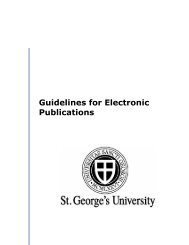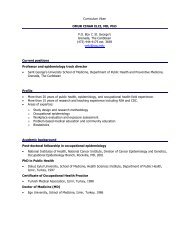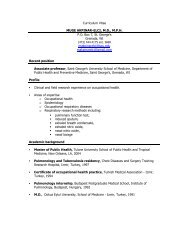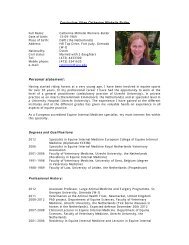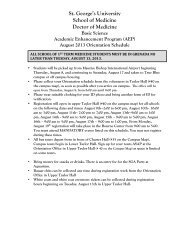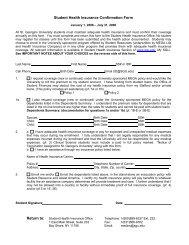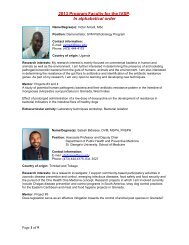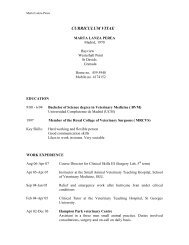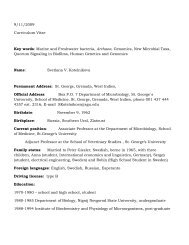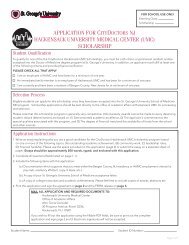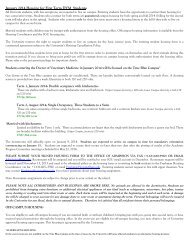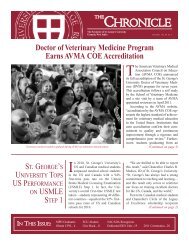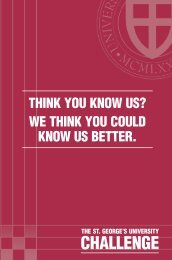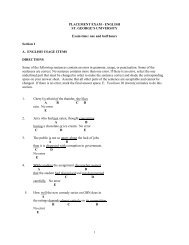SCHOOL OF 2012-2013 - St. George's University
SCHOOL OF 2012-2013 - St. George's University
SCHOOL OF 2012-2013 - St. George's University
You also want an ePaper? Increase the reach of your titles
YUMPU automatically turns print PDFs into web optimized ePapers that Google loves.
School of Medicine<br />
Course Descriptions<br />
speaking patients in their future. In the United <strong>St</strong>ates,<br />
particularly, it has become an absolute necessity for health<br />
care providers to have at least a minimal understanding<br />
of the Spanish language in order to reduce frustrations<br />
stemming from the lack of ability to communicate with<br />
the nation’s fastest-growing non-English speaking group.<br />
In addition to the significant lack of control that health<br />
care providers feel at not being in command of the<br />
language of their patients, the predicament of non-English<br />
speaking patients in need of medical care is of crucial<br />
concern as well. The course, which will be offered at the<br />
<strong>University</strong>’s main campus, will provide students with a basic<br />
introduction to Spanish grammar and sentence structure,<br />
as well as an overview of vocabulary for specific medical<br />
purposes. <strong>St</strong>udents will be expected to have had some<br />
exposure to Spanish language instruction, as well as be in<br />
good academic standing in order for the more specialized<br />
medical instruction to be beneficial. The course will cover<br />
such topics as basic grammar skills, emergency medicine, a<br />
visit to the family practitioner, basic anatomy, and dealing<br />
with sensitive cultural issues.<br />
SCSK 514<br />
American Sign Language (ASL)<br />
Robert Hage, MD, PhD, DLO, MBA<br />
This one-credit selective is offered once a semester and will<br />
fall within the start/stop dates of the first term. Ten sessions<br />
are scheduled per semester. <strong>St</strong>udents are expected to<br />
attend and actively participate twice a week in a one-hour<br />
session during which a teacher from the School for the<br />
Deaf will teach American Sign Language (ASL). Guest<br />
speakers will cover topics such as speech training, causes<br />
of deafness, prevention of deafness, and hearing aids. This<br />
will add to each session an element of theory and practical<br />
information related to deafness. <strong>St</strong>udents are expected<br />
to practice their acquired sign language skills with each<br />
other between sessions and demonstrate some of their<br />
skills during each session. Video cassettes are available for<br />
viewing in the library. Visits to the School for the Deaf are<br />
recommended.<br />
SCSK 515<br />
Clinical, Ethical, and Neuroscience Aspects of Pain<br />
Katherine Yearwood, MBBS<br />
Pain is an important symptom in medicine but<br />
undertreated pain and its management are relatively<br />
neglected in medical curricula. This one-credit selective<br />
will define pain and introduce it as a public health problem.<br />
It will explore the neuroanatomy and neurophysiology<br />
of pain, and psychological, sociological, and bioethical<br />
aspects of pain. <strong>St</strong>udents will be taught to do pain histories,<br />
assess levels of pain and effectiveness of pain relief, and be<br />
introduced to treatment options. The course includes visits<br />
to Grenada General Hospital and/or geriatric homes and/or<br />
rounds with community nurses.<br />
SCSK 516<br />
Research Ethics<br />
Cheryl Macpherson, PhD<br />
This selective fosters professional development,<br />
strengthens ethical sensitivity and reasoning ability,<br />
and enhances knowledge and understanding of the<br />
complexities of existing research ethics guidelines. This<br />
course focuses on the role of human participants and<br />
the intersection of research with medical and veterinary<br />
medical clinical practice and public health. <strong>St</strong>udents<br />
participate in seminars and case discussions involving<br />
international guidelines, therapeutic misconception, use of<br />
stored tissues, and cultural and socioeconomic factors that<br />
bear on international research collaborations. The ethics<br />
of authorship and plagiarism are explored. The course<br />
expands upon the SOM and SVM required curriculum on<br />
research ethics, enabling students to gain deeper insight.<br />
SCSK 517<br />
International Trauma Life Support (ITLS)<br />
Theresa McCann, PhD, MPH<br />
This selective is offered at two levels: Advanced Level for<br />
students who are health care professionals; Basic Level<br />
for all other students. During this course, students will<br />
enhance their knowledge and skills necessary to efficiently<br />
and effectively manage patients who are affected by<br />
trauma. <strong>St</strong>udents will learn current International Trauma<br />
Life Support (ITLS) algorithmic approaches to managing<br />
patients from both a cognitive and skills-based approach<br />
using didactic presentations, interactive skills stations,<br />
and case scenarios. The ITLS selective covers the skills<br />
necessary for rapid assessment, resuscitation, stabilization,<br />
and treatment or transportation of trauma patients.<br />
Emphasized are the evaluation steps, sequencing and<br />
techniques for resuscitation, and packaging a patient.<br />
Realistic simulations reinforce the key concepts, such as<br />
proficiency in basic life support care, basic and advanced<br />
airway, chest decompression and fluid resuscitation, spinal<br />
restriction and rapid extrication, short back board, helmet<br />
management, log roll and long back board, traction splints,<br />
68 | <strong>St</strong>. George’s <strong>University</strong>



